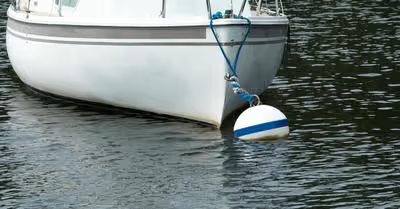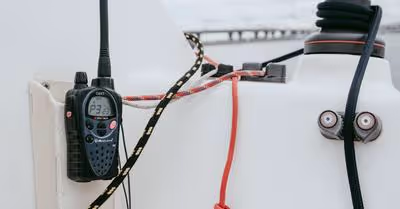Table of Contents
Life on a Sailboat
With real estate prices in places like London, San Francisco, and Vancouver skyrocketing, an increasing number of individuals are opting for a more adventurous lifestyle: living aboard a boat. Living aboard a boat has several advantages, including low rent, breathtaking vistas, and the potential to make you a more fascinating person at dinner parties.
It's easy to romanticize the concept of living aboard a boat full-time, but such an unconventional lifestyle necessitates planning, organization, and the capacity to adapt to change. Make checklists of essentials and discuss deal-breakers with your partner once you've decided to go abroad. Before you move, make sure the boat is ready for life on board.
Yes, you can live on a yacht all year round, and the flexibility to pick up your roots and relocate to warmer waters is one of the main reasons many choose to live on a sailboat year-round rather than seasonally.
For instance, those living in the East Coast during the winter would find it quite uncomfortable. Boats do not have the same level of insulation as a home or apartment. In the thick of winter, temperatures in New York may dip below -20 degrees, which would be dangerous aboard a sailboat.
The insulation is inadequate, the heating system will be inadequate, and you will be in direct touch with water that may likely freeze solid, causing damage to the boat's hull. Part of the attractiveness of living on a sailboat is the ability to shift to warmer seas before winter. There are certain disadvantages to living on a yacht, since it does have its restrictions.
The “Facilities”
The majority of low-cost liveaboard vessels lack hot showers and laundry facilities. They also feature teeny-tiny bathrooms and kitchens, as well as very little storage. Living aboard a boat is not for you if you can't handle the notion of giving up bubble baths. If, on the other hand, the notion of a minimalist, multi-purpose, stacking dish set appeals to you, you're on the right track. That said, it is important to remember that some boats are better equipped for living aboard than others.
Weather Woes
It's fantastic to get away from the hard winter months by sailing, but there's no way to completely avoid terrible weather no matter where you go. Even states like California are subject to storms on occasion.
Flooding, runoff, hail, debris, and lightning may all cause catastrophic damage to your boat. Staying aboard your boat during a violent storm puts you at danger of injury. If you can't swim, you're unlikely to drown at a marina, but you may be gravely harmed. The storm is impossible to outsail, at least not easily.
Space
Sailboats are rather tiny. Even the largest sailboats are little when compared to a whole home. While a house may have many rooms, a garage, and cupboards throughout, your boat will not because that isn't possible. When trying to fit the necessities on the boat, you'll have to give up a lot of your belongings. Extras might be stored in a storage container, and you may be forced to do so.
Boats have a certain amount of storage space. This is one of the reasons why boating is seen to be a simpler way of life; you won't be able to keep all of your belongings. Depending on your perspective, this is either a pro or a con.
"How can you live on a yacht?" is the most common question we get. That’s mainly due to the fact that when you’re on a boat, there is rarely any personal space. Imagine having to beg your lover to move out of the way every time you walk from the kitchen to the bedroom, and that pretty well sums it up. If this is your primary concern, consider living on a trawler rather than a sailboat, as a 35-foot trawler provides far more living space and light than a 35-foot sailboat.
Laidback Lifestyle
On the flip side there are many reasons why folks prefer to live on a yacht or houseboat. If you alternate between being on the boat and being on shore, your pace of life is always shifting. Living aboard a boat is significantly simpler than living in a regular home, and attempting to balance both will just add to your stress. It will be a lot easier to live aboard a boat year-round than it will be to alternate between the two.
Of course, simply living in a regular house would be more convenient. That, on the other hand, is unlikely to pique your attention. It also entails ongoing lifestyle modifications. It's almost as if you'd have to live two lives at the same time.
The Cost
Making and sticking to a budget is the most effective strategy to control spending. Boat insurance may be as expensive as home insurance, depending on the size and value of the vessel. Because you won't be heating, cooling, or lighting as much room, property taxes and electricity will be lower. You'll almost certainly save money on garbage disposal, gas, and water.
Maintenance is an area where prices skyrocket. Marine components and labor are typically more expensive than their domestic counterparts, sometimes by as much as 20%. If you're self-employed and take on the responsibilities yourself, every hour you spend working on your yacht is an hour you're not earning money.
Although living aboard a boat does not need paying rent in the same way that living in an apartment does, it does necessitate hiring a marina slot. The cost might be either less or much more than renting a regular house, depending on the marina.
Living aboard your sailboat year-round rather than seasonally saves you a lot of money since you still need to rent a marina spot whether you live on the boat or not. If you opt to live in an apartment for a third of the year, you must now pay for both the apartment and the marina slip. This may add up quickly over the course of a few months or even a year.
Maintenance, Mortgage and Taxes
The cost of maintenance may vary, depending on whether you perform it yourself and the state of the boat. Marine materials are often three to four items more expensive as compared to the materials that are used to build residential apartments. Expect to pay up to $6000 each year.
The cost of a liveaboard boat can range from nothing to $200,000. You will have monthly mortgage payments if you finance your yacht. Taxes may vary, depending on your location. For instance, in California taxes are 1.1 percent of the vessel's current worth.
The Location
It will be considerably different to live aboard a yacht at a marina than it will be to live on a mooring buoy. Things like power and water (at a marina, you'll have 24/7 access to both, whereas on the hook, you'll be living off-grid) are crucial considerations. If you wish to take a shower (particularly a hot shower) every day, this can make a great impact. At a marina, it's doable; on the hook, it's tough, if not impossible.
Another advantage of dock living is the ability to step off the boat. Taking a dinghy back and forth every day might be inconvenient, especially if you're moving dogs, motorcycles, or big equipment. Comforts like internet, television, and laundry are also available in liveaboard marinas.
Finding a location to anchor your boat might be difficult, depending on where you live. Many major cities have liveaboard licensing requirements, and as a result, many liveaboard approved marinas have long waiting lines. Don't buy a boat until you've decided where you'll store it. Although some unlicensed marinas will overlook "sneak-a-boards," you run the danger of being thrown out at any moment.
Other Considerations
All the closets and cupboards are smaller, the cabinets are fewer, and there is no two-car garage when you go from a 2,000-square-foot dwelling to a 42-foot yacht. You'll need to de-clutter your kitchen equipment, utensils, souvenirs, and apparel in advance. If feasible, keep your winter clothes in off-boat storage and your professional dress at the office.
Make sure the boat is warm and well-ventilated. Mildew and condensation will become commonplace, necessitating the purchase of a new set of cleaners and equipment. Make a list of your connectivity requirements. You'll need a connectivity option to stay connected to work, family, and friends, and that you have a TV dish or high-speed internet access. The good news is that you can have access via the marina WiFi.
Recent Articles

















